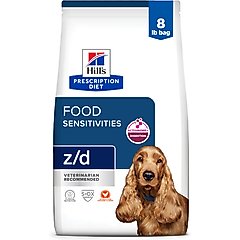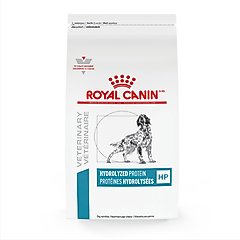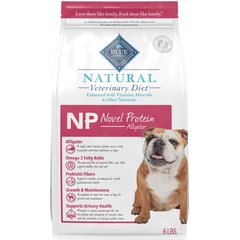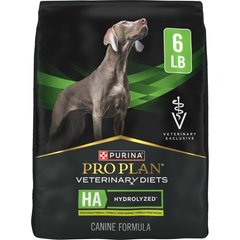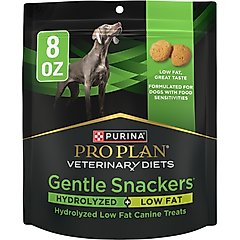Food Allergies vs. Food Intolerances in Dogs: What’s the Difference?
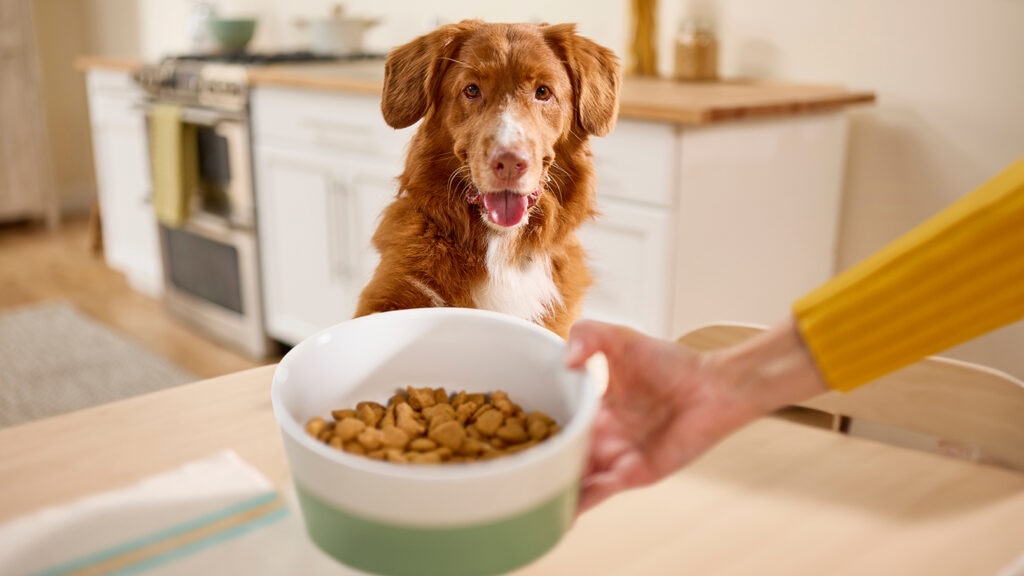
Photo by Chewy
Is your dog scratching a lot more than usual, developing red rashes on their body, or having tummy troubles?
Like people, dogs can have food allergies and intolerances and experience adverse reactions that range in severity after consuming a specific food. Depending on whether the root cause is a sensitivity or a true allergy, these symptoms can result in general discomfort and even secondary infections.
We talked to experts to learn more about the differences between a food allergy and food intolerance in dogs and tips on how to manage them long-term.
Speak with your veterinarian if you suspect your dog has a food allergy or intolerance.
Key Takeaways
- While food allergies and intolerances in dogs both involve adverse reactions to certain foods or ingredients, a food allergy involves the immune system, whereas a food intolerance involves the digestive system.
- Symptoms of dog food allergies often include skin/ear issues, while intolerances tend to cause GI signs.
- Proteins are often the top trigger for a dog food allergy or intolerance.
- Although dog food allergies and intolerances can’t be cured, they can be managed with a change in diet and avoidance of the trigger. It’s always best to reach out to your vet for guidance to keep your dog happy and healthy.
Food Allergies vs. Food Intolerances in Dogs
Here’s a side-by-side comparison of food allergies vs. food intolerances in dogs:
| Food Allergy | Food Intolerance | |
|---|---|---|
| System affected | Immune system | Digestive system |
| Common signs | Itchy skin, ear infections, hives, facial swelling | Gas, bloating, diarrhea, vomiting |
| Onset | Hours to days after eating allergen | Often immediate or within a few hours |
| Diagnosis | Requires elimination diet and vet testing | Typically based on symptoms and food trials |
| Treatment | Avoid trigger; may need medications or allergy diet | Avoid trigger; dietary adjustment usually enough |
Food Allergies in Dogs
Food allergies happen when a dog’s immune system mistakenly treats a harmless ingredient—usually a protein—as a threat. It’s an overreaction, similar to how people respond to allergens like pollen or peanuts, explains Sabrina Kong, DVM, certified canine rehabilitation practitioner at Jules Veterinary Center, in Tracy, California.
Signs of Food Allergies in Dogs
Being able to spot symptoms of a food allergy can prompt you to seek veterinary care, relieve allergy-related discomfort your dog is feeling, and prevent potential infections.
Some telltale signs of food allergies in dogs include:
- Severe itching, especially on the paws, ears, and face
- Frequent skin or ear infections
- Chronic diarrhea
- Vomiting
- Red, inflamed skin
- Recurring anal gland infections
- Skin sores
- Hives (rare)
- Facial swelling (rare)
Causes of Food Allergies in Dogs
It’s unclear what causes food allergies in dogs. What we do know is:
- They can develop in any dog and at any age.
- Certain breeds, such as Cocker Spaniels and West Highland White Terriers, can be more likely to have food allergies.
- Dogs can have reactions to more than one type of food.
“The most frequent culprits behind true food allergies are proteins found in common commercial dog foods,” Dr. Kong says.
Overall, the most common food allergy triggers include:
- Beef
- Chicken
- Dairy products
- Lamb
- Wheat
Dogs can also develop allergies to soy, fish, eggs, pork, rice, and corn, but this isn’t as common.
Keep in mind that true food allergies are rare and affect 1–2% of dogs, according to research. Most cases of what pet parents perceive as a “sensitivity” are actually food intolerances or environmental allergies to things like pollen or fleas, Dr. Kong says.
How Vets Treat Food Allergies in Dogs
To diagnose a food allergy, veterinarians recommend an eight- to 12-week elimination diet with hydrolyzed foods (where proteins are broken down to reduce the risk of an adverse reaction) or novel-protein foods, such as duck or salmon.
Commercial blood tests are often unreliable and aren’t a recommended diagnostic tool, Dr. Kong says.
The only effective, long-term solution for food allergies is strict avoidance of the specific allergen, Dr. Kong says. If your pooch is having adverse reactions to chicken, for example, you’ll want to make sure it isn’t included in the ingredient list for your dog’s food and treats. Your vet might recommend feeding a veterinary dog food as an alternative to doing an elimination diet.
Medications, such as Apoquel or Cytopoint, can be used to manage an allergic flare-up, but they’re not a substitute for a proper diet change, Dr. Kong says. While food allergies are manageable, they’re not curable; even a tiny trace exposure can be enough to restart a full cycle of symptoms, she adds.
The Best Dog Food for Food Allergies
“For dogs with a confirmed food allergy, the best option is to use a veterinary therapeutic diet to completely avoid any cross-contamination,” Dr. Kong says.
Some high-quality dog food options she recommends for dogs with allergies include:
- Hill’s Prescription Diet z/d: This dog food uses hydrolyzed chicken protein, which is broken down microscopically to evade immune detection, making it highly palatable and great for skin health.
Recommended Product
- Royal Canin Hydrolyzed Protein HP: This dog food uses hydrolyzed soy protein with added omega-3s, which is ideal for dogs with known poultry or beef allergies.
Recommended Product
- Blue Buffalo Natural Veterinary Diet NP: This dog food offers novel protein sources, such as alligator, which are suitable for dogs who don’t respond to hydrolyzed diets.
Recommended Product
Avoid grain-free diets unless your dog is specifically allergic to grains, as these diets have been linked to potential heart disease issues, Dr. Kong notes.
Food Intolerance in Dogs
A food intolerance in dogs, such as lactose intolerance, occurs when the digestive system struggles to process a certain ingredient, Dr. Kong says.
Unlike a food allergy, an intolerance doesn’t involve an immune system response.
Signs of Food Intolerance in Dogs
According to Dr. Kong, dog food intolerance signs may include:
While there can be some overlap between signs of food intolerances and food allergies, the most telling difference between the two is that a persistent itchiness occurs with allergies, Dr. Kong says. Food intolerance symptoms are generally milder compared to food allergy symptoms.
Causes of Food Intolerance in Dogs
As with food allergies, all dogs can develop an intolerance to a particular food at any point, and some dogs can be genetically predisposed to having one. However, the exact reason why some dogs develop them and others don’t is unknown.
Common triggers of dog food intolerances include:
- Beef
- Dairy products
- Chicken
How Vets Treat Food Intolerance in Dogs
If you suspect your dog has an intolerance to a certain food, your dog’s vet might take the same approach as they would with a food allergy.
“Most veterinarians treat food intolerance in dogs through dietary management, typically through elimination diet trials to identify and avoid offending food ingredients,” says Bethany Hsia, DVM, mobile veterinarian and co-founder of CodaPet, in Clovis, California.
With an elimination diet, you’ll feed a novel or hydrolyzed protein diet to allow the body to “detox” and symptoms to clear, she explains.
Once your pup’s symptoms resolve, ingredients are slowly reintroduced to check which food might be the specific trigger for the intolerance.
The Best Dog Food for Food Intolerance
Two dog foods Dr. Hsia considers to be good options for dogs with food intolerances include:
- Royal Canin Veterinary Diet Adult Hydrolyzed Protein HP: This dog food uses hydrolyzed soy protein to help manage food sensitivities and digestive problems.
Recommended Product
- Purina Pro Plan Veterinary Diets HA Hydrolyzed: This dog food is formulated for dogs who need protein that isn’t animal-based.
Recommended Product
Consult your vet if you have any questions about which dog food is the best choice for your pup’s individual needs.
How Do I Manage My Dog’s Food Allergy or Intolerance?
Managing any kind of dog food intolerance or allergy requires always paying close attention to what’s in your pooch’s food to keep them happy and healthy.
Dr. Kong shares these tips on how to manage your furry friend’s food allergy or intolerance long-term:
- Read food labels carefully to avoid any ingredient your dog reacts to. To prevent exposure to a problematic ingredient, read all food labels closely—treats included! Watch for phrases like “chicken flavor” or “animal digest” that can contain hidden allergens as well. Check with your veterinarian to see whether hypoallergenic treats, such as Purina Pro Plan Veterinary Diets Gentle Snackers, are suitable for your pup.
Recommended Product
- Prevent cross-contact. Wash food bowls separately and use dedicated utensils to avoid the risk of cross-contact if you have a multi-pet household.
- Track symptoms. Note any environmental changes, such as seasonal pollen, that could be worsening your dog’s allergies.
- Supplement your dog’s diet. Omega-3 fatty acids, like fish oil, can help reduce skin inflammation. (Although, this isn’t a substitute for dietary management.)
“Always have an emergency plan ready,” Dr. Kong says. “Keep a signed vet authorization form handy for urgent care in case of an accidental exposure.”
FAQs About Food Allergies and Food Intolerances in Dogs
What is food hypersensitivity in dogs?
Food hypersensitivity in dogs refers to when they have an adverse reaction, such as itching, chronic diarrhea, or recurring skin infections, to a certain food ingredient.
What is the most common food allergy in dogs?
The most common food allergy in dogs is beef, according to a 2016 study.
Can a food allergy be cured in dogs?
No, a food allergy can’t be cured in dogs. However, it can be managed by strictly avoiding the allergen in dog food and treats, as well as food-based items, such as flavored toys and pill pockets.
How long do food intolerance symptoms last in dogs?
Research has found that food intolerance symptoms in dogs can last for hours or days at any time, sometimes occurring a few hours or days after consumption.
How is food intolerance tested in dogs?
Food intolerance is tested in dogs using a dietary elimination trial, as it’s the most reliable method. This consists of avoiding and replacing a particular ingredient and closely monitoring a dog’s symptoms to see whether they improve with the diet change. A true diagnosis is made after improvement is seen with avoidance and symptoms recurring after a brief reintroduction.
